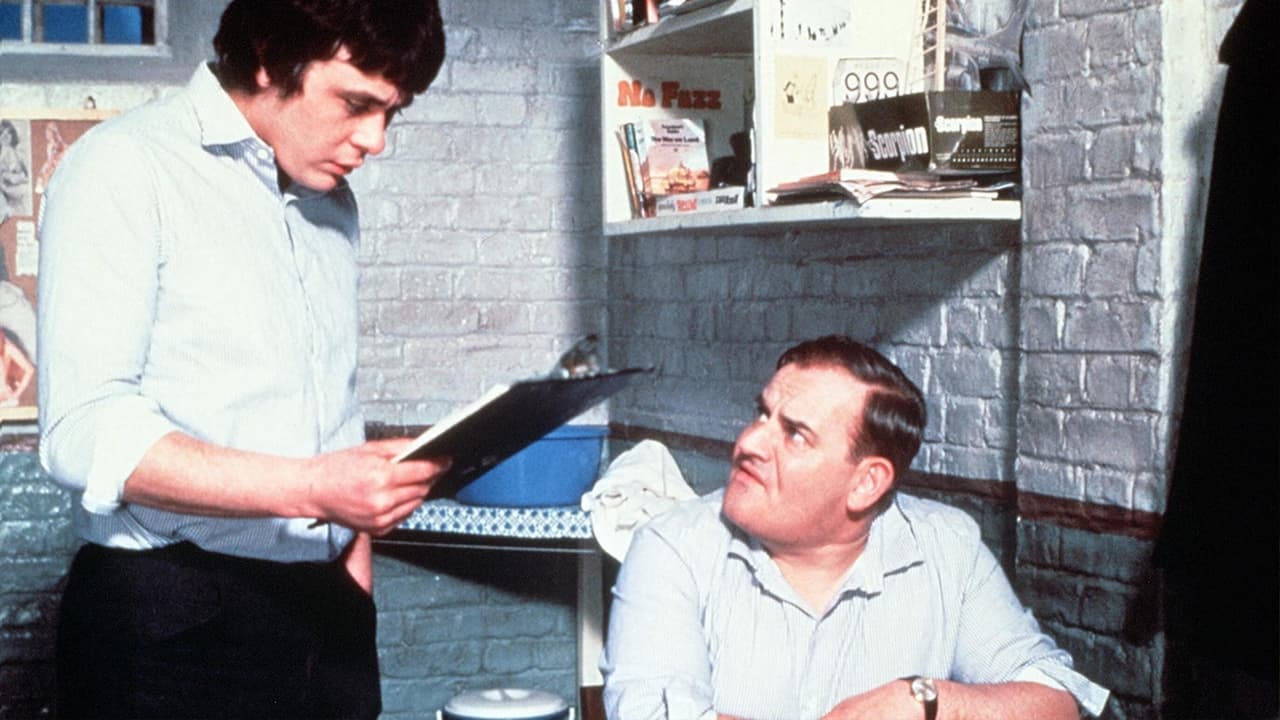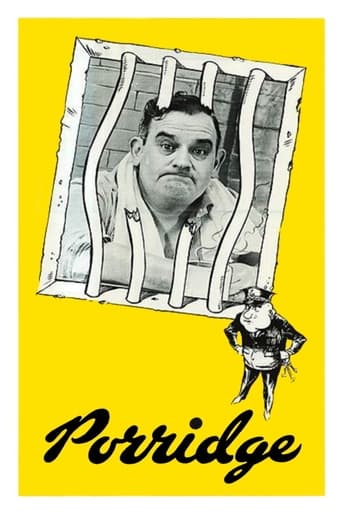



Wonderful character development!
Too much of everything
Plot so thin, it passes unnoticed.
Highly Overrated But Still Good
Porridge is a spin off film from the successful TV series of the same name that aired on British BBC1 between 1974 and 1977. It's directed by Dick Clement who also co-writes with Ian La Frenais. It stars Ronnie Barker, Richard Beckinsale, Fulton Mackay, Brian Wilde and Peter Vaughn. Lets face it, and lets be honest here, for many Brits who grew up with the TV show, Porridge is simply one of the greatest shows Britain has ever produced. Sharp and on the money in writing and characterisations, and boasting a cast that were always irresistible, it still manages to enthral millions today during continuous reruns on cable and satellite TV. In light of the regard and popularity the show had, it was perhaps inevitable that a film production was just a matter of time, because, well, all the great British comedies of the past had feature films made. But of course not all were particularly any good. So it's with much relief to find that the film version of Porridge is a very decent offering. The plot sees Fletcher (Barker) involved as the manager of the prison football team, to which, unbeknown to the wily old lag, is being used as a front for an escape attempt by Oakes (Barrie Rutter), and naturally the smarmy menace of Grouty (Vaughn) is pulling the strings. Fletcher & Godber (Beckinsale) then accidentally get caught up in the escape and thus have to break back into the prison before anyone catches them! This set-up is wonderful and makes for some very funny comedy, executed with aplomb by Barker, Mackay and co. True that taking the characters out of the confines of the prison strips away much of what made the TV series so special, but the characters are so strong, the actors chemistry so evident, film stands tall enough to not sully the reputation of the show. It's a delightful way to spend an hour and half with your feet up, as a stand alone film it entertains those not familiar with the TV show. While for us fans? It sits nicely alongside the show as an extended viewing of comic genius behind and in front of the camera. 8/10RIP fellas, your legacy lives on always.
View MoreDick Clement and Ian La Frenais seized the opportunity the 1970s genre of British sitcom movies offered. they took it, few other scriptwriters did. This was, namely, the chance to do on the silver screen what they could not do on prime-time BBC. Lovable caricatures are subtly toned down here - Fletcher begins with the persona from the sitcom then changes. The quipping, upbeat Fletcher is revealed as a mask for the born loser/survivor he truly is.The opening scenes where new character 'Grudge', a new, young inmate, is booked in and led around by the wardens could easily have been taken from John McKenzie's 'A Sense of Freedom'. Mckay, too, is deftly rendered a touch more three-dimensional. His mantra bemoaning the inmates' status as lower than normal people betrays his true feelings.Peter Vaughan's Kray-like 'Grout' again all but turns to the camera and says "That's a cartoon version of me on the telly - I'm really a nasty piece of work'. The film very subtly does that which recent Brit comedy-turned-movie 'The League of Gentlemen's Apocalypse' deliberately attempted - the creation of real-world versions, far less comfortable versions, of the stalwart caricatures of the TV show's pantheon.
View MoreEngland was writhe with crime, in the cinematic sense, toward the end of the decade that had brought us Glitter Rock and Punk Rock. Toward the end of the Seventies and with the crossover into the Eighties, prison movies were to include the brutal Scum (1979), the Houdini exploits of McVicar (1980), and not forgetting the vicious ladies known as Scrubbers (1983), these Made In Britain misfits are amongst the serious and uncompromising hardcore collection of the riffraff prison underclass of that time.This era's theme of imprisonment had also been the subject of light relief and comic substance, to the happy go lucky tune of life's misplaced souls that were doing Porridge, (as the movies American title suggests Doing Time): the English term for being imprisoned, you were "Banged to Rights" you were "Doing Time" and "Doing Porridge".Nineteen seventy-four saw the release of British comedy sitcom Porridge; written by Dick Clement and Ian La Frenais, this later turned into the spin-off movie of the same name. Fundamentally an extension of the early seventies comedy show, we have the enduring and ever wistful Norman Stanley Fletcher, with his unforgiving contempt for authority and the establishment alike. The two writers here have not deviated from his original persona; a charm and charisma that transcends from television play and onto the movie screen, with his wise old owl intellect that knows best and never throws caution to the wind. Though the script is the classic all-round family entertainment variety, the actual storyline is somewhat basic and considering the genre here, apt.Richard Beckinsale (1947 - 1979), as Lennie Godber, father to the beautiful Kate Beckinsale, born 1973, of Underworld (2003) and Van Helsing (2004), fame sadly passed away shortly after the making of Porridge, of a heart attack. While too young, his legacy has been passed on through his daughter, he would have been extremely proud to have seen her accomplishments. The world of light entertainment would never be quite what it was without him. Porridge is awash with the best of British, such as Fulton Mackay (1922 - 1987), Brian Wilde, Derek Deadman, Ken Jones and of course the greatest modern English comedy writer and actor the late Ronnie Barker (1929 - 2005).This extension of the small screen had to have direction that was capable of retaining the attention span of an audience used to only the weekly half hour shows. The big screen adaptation is classic British cinema; the titters and chuckles among the theatregoers is only contagious. Humour abound, with its pessimistic and anti-establishment overtones that, while nonconformist, only reminds these prisoners of their individual plight. Here we see the pecking order of the hierarchy that are the building blocks of any modern day society. With its top dog Grouty, with his bodyguards Samson and Delilah, then there are the gofers, the go for this and go for that, the illiterates and we have the young and naive first offender Rudge, played here by Daniel Peacock, for example. In between this, we have the officers, just as misfit and imprisoned, though physiologically, as their jailbird counterparts. All bound together by a very wonderfully sharp and intelligent script, bringing about the adage sarcasm is the lowest from of wit, well this is not sarcastic humour, nor is this toilet humour, this is well written and thought out superlative comical fun. Any wonder then that during 1980 Porridge had won the Evening Standard British Film Award for Best Comedy.
View MoreMany 1970s British TV comedy series were made into films - most were dire. This film is excellent, but below the level of the TV series which is one of the funniest programmes ever made. The characters (most of them) are all there from the TV series, but the pace is slower and thereby suffers in comparison. Despite this, the film is definitely worth watching. The plot centres around an elaborate escape plan which doesn't quite work the way it was intended, but Fletch, Godber, MacKay and Barrowclough can all be relied on. Perhaps the star of the film is Peter Vaughan as Grouty - at the centre of the action for a change. See the film - but see the TV series too.
View More